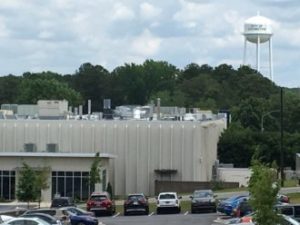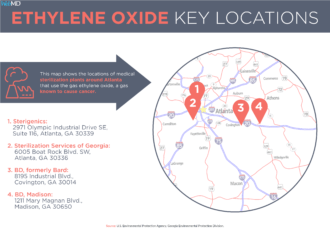Brenda Goodman is a senior news writer for WebMD. Andy Miller is editor and CEO of Georgia Health News.
State environmental officials say a warehouse operated by a medical sterilizing company in Covington, a suburb of Atlanta, is releasing high levels of the toxic gas ethylene oxide.
The state’s Environment Protection Division (EPD) has charged the company, BD — which also runs a sterilizing plant in Covington — with a violation for operating the warehouse, which is a global distribution center, without an air quality permit.
BD has until Friday at 1 p.m. to respond to the state’s “notice of violation.’’

The BD warehouse facility in Covington stores equipment that recently has been sterilized in the company’s plants in Covington and the town of Madison, about 25 miles to the east, as well as in other sterilization facilities. After being sterilized, equipment will continue to release ethylene oxide into the air for a period of hours or even days, a process called off-gassing.
In an October consent order with the state, BD was required to provide estimates of fugitive emissions of the cancer-causing gas at its warehouse.
The company told Georgia environmental officials Dec. 15 that the estimated fugitive emissions from that facility were 5,600 pounds per year, the EPD said Wednesday in a news release.
In its latest emissions report, BD said its sterilization facility in Covington released an estimated 656 pounds of ethylene oxide (also known as EtO) in 2018. That means the warehouse, which has no pollution controls, is releasing almost 9 times more than what was reported coming from the sterilization plant.
Current law requires that facilities with a potential to emit greater than 4,000 pounds a year of ethylene oxide have a permit and install emissions controls.
Gov. Brian Kemp called the warehouse emission results “highly concerning.’’
“We are demanding answers from BD to remedy this unlawful activity,’’ Kemp said in a statement Wednesday. “I have directed state officials to act as swiftly as possible to secure compliance, and we are exploring every legal remedy available to us to ensure the health and safety of the surrounding community. Ultimately, we expect the company to comply with our requests and do the right thing for Newton County families.’’
The ethylene oxide issue erupted in Georgia in July, after a WebMD and Georgia Health News report that detailed the cancer risks associated with the sterilizing gas and the Georgia facilities using it. That report sparked public outrage and scrutiny from officials.
Last year, the federal Environmental Protection Agency (EPA) identified census tracts in Covington, about 35 miles east of Atlanta, and in the Smyrna area, just northwest of Atlanta, as having increased cancer risks, largely due to ethylene oxide. Smyrna, in Cobb County near the Fulton County line, has a sterilizing plant run by the company Sterigenics that also uses the gas.
The Sterigenics plant has been closed for several weeks until it meets Cobb County safety standards. Medical sterilizing plants in Illinois and in Michigan have shut permanently amid public outcry about the use of ethylene oxide.
A spokesman for the state EPD said the agency doesn’t know how long the Covington warehouse has been operating.
Michael Geoffroy, an attorney representing area residents with cancer, said Wednesday that “BD has known about the exposure at the warehouse from the beginning, at least 15 years ago. Yet BD chose to mislead regulators and the public, hiding the dangers of EtO off-gassing and fugitive emissions. Every denial by BD, every statement, is just more of the same cover-up, all while more victims get cancer and die.”

The level of emissions from the warehouse “is very surprising,’’ said Cindy Jordan, a member of the local activist group Say No to EtO. “It baffles me. I wasn’t even worried about [the warehouse.]’’
“They’re continuing to endanger the community,’’ Jordan added. “I think they should shut down the whole sterilizing process.’’
The state’s notice of violation Wednesday seeks to prevent BD from putting any supplies sterilized with EtO into the storage facility from Dec. 23 through Jan. 6.
It also requests that the company monitor ambient air at residential areas and school near the distribution center. The state also asks BD to submit a permit application for the warehouse that will include installation of air pollution control equipment to destroy no less than 99 percent of ethylene oxide emissions.
The state EPD, in its notice of violation, said fines could range up to $25,000 per day.
The company, in its Dec. 15 letter to Karen Hays of EPD, said the results of indoor air sample tests ‘‘were higher than anticipated.’’

BD said it is increasing the frequency of monitoring of employee exposure, and is exploring adoption of different sterilization processes. It said a section of the warehouse that stores “acute urology procedural trays’’ had the highest readings of ethylene oxide.
In a statement Wednesday, the company said that air monitoring data from inside and outside the facility “confirm that BD’s facility is safe for employees and the community.”
BD added that air monitoring confirms that ethylene oxide levels in the ambient air outside the warehouse are in line with “background” EtO levels found by both EPD and the federal EPA at air monitoring sites in Georgia and across the country where there are no industrial sources of EtO.
The city of Covington said in October that preliminary data from air pollution testing found ethylene oxide levels that were particularly high in two neighborhoods close to the BD sterilizing plant.
City officials, in a statement Wednesday evening, said, “We appreciate the continued efforts of the Georgia EPD and the support they are giving our community. While we are concerned by the notice of the recently released violations against BD’s warehouse in Covington, we are confident BD will follow the actions and responses as directed by the EPD and regain compliance soon.
“Citizens can rest assured City of Covington officials will continue to take an active role ensuring the air quality in Covington is satisfactory.”

